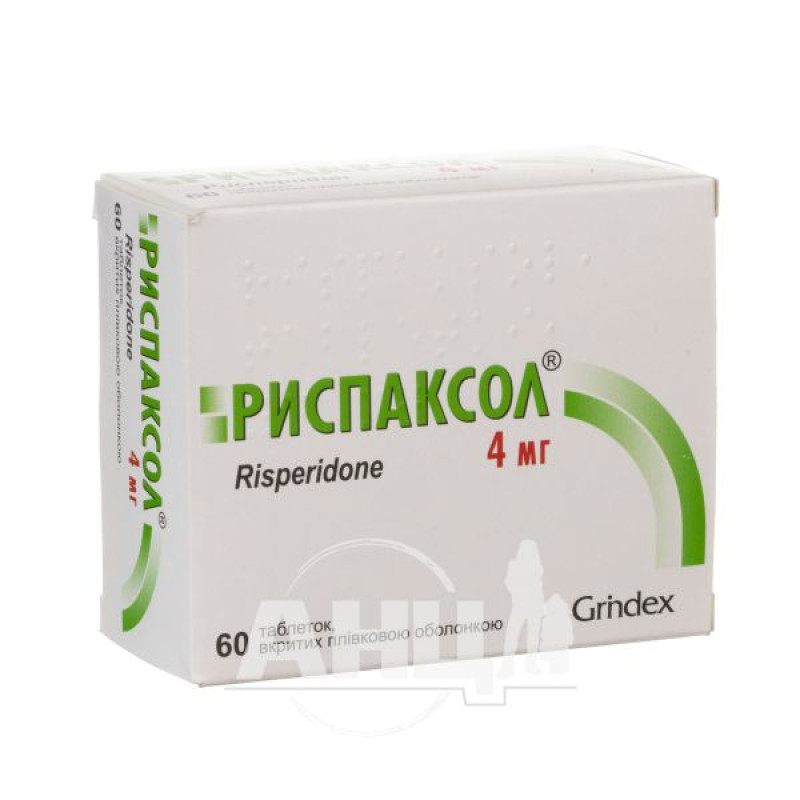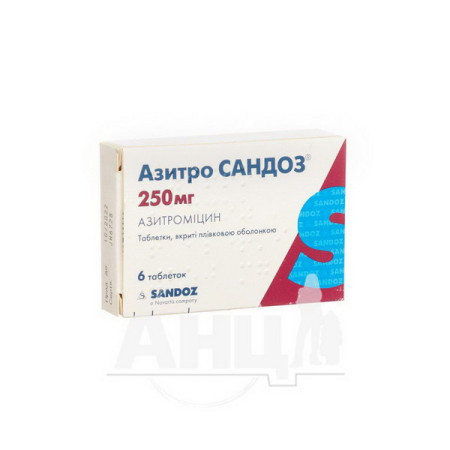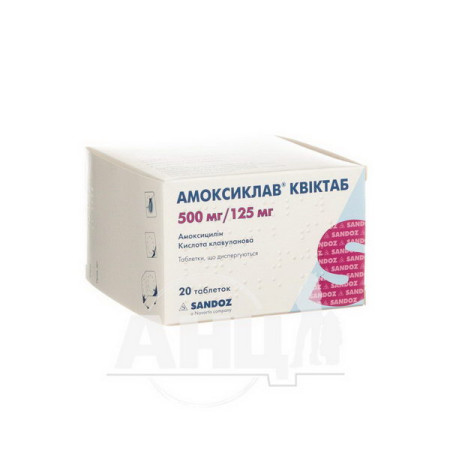Rispaxol film-coated tablets 4 mg blister No. 60

Risperidone tablets are prescribed for the following indications:
Treatment of schizophrenia and other psychiatric disorders, including maintenance therapy, in patients who have responded to therapy, in order to prevent relapse of the disease. Treatment of manic episodes in bipolar disorders (adjunctive therapy in combination with normotensives as initial treatment or as monotherapy for a period of up to 12 weeks). Short-term treatment of pronounced aggression or severe psychiatric symptoms in patients with dementia when there is a threat of harm to themselves or others. Symptomatic treatment of defiant oppositional disorder or other social behavior disorders in children, adolescents and adults with below average mental development or mental retardation, who have manifestations of destructive behavior (impulsivity, autoaggression). Symptomatic treatment of autistic disorders in children from 5 years of age, in whom symptoms range from hyperactivity to irritability (including aggression, self-harm, anxiety and pathological cyclic actions).Composition
Active ingredient: risperidone;
1 tablet contains 2 mg or 4 mg of risperidone;
Excipients: anhydrous lactose, corn starch, magnesium stearate, colloidal anhydrous silicon dioxide, microcrystalline cellulose;
shell:
2 mg tablets - Opadry Orange OY-8729 (hypromellose, macrogol 400, titanium dioxide (E 171), sunset yellow FCF (E 110), quinoline yellow (E 104)), macrogol 6000, carnauba wax; 4 mg tablets - Opadry AMB Green 80W21165 (iron oxide (E 172), indigo carmine (E 132), soy lecithin, polyvinyl alcohol, quinoline yellow (E 104), talc, titanium dioxide (E 171), xanthan gum), carnauba wax.Contraindication
Hypersensitivity to the active ingredient or to any of the excipients in the preparation. Dementia and symptoms of Parkinson's disease (rigidity, bradykinesia and parkinsonian postural disorders). Dementia and suspected dementia with Lewy bodies (in addition to symptoms of dementia, less than two of the following symptoms: parkinsonism, visual hallucinations, unsteadiness of gait).Method of application
Usual dose: Risperidone can be taken once or twice daily. Doses greater than 8 mg should be divided into two doses (morning and evening).
Application features
Pregnant women
It is not recommended for use during pregnancy, except in cases of vital necessity.
Children
Risperidone is used to treat social behavior disorders or aggressive behavior, as well as autistic disorders in children aged 5 years and older; to treat manic episodes in bipolar disorder in children aged 10 years and older.
Drivers
Risperidone may have minor or moderate influence on the ability to drive due to potential effects on the nervous system and visual organs. During treatment, it is recommended to refrain from driving or operating machinery until the patient's sensitivity to the drug is known.
Overdose
Signs and symptoms of overdose are known adverse drug reactions, which manifest in an intensified form: drowsiness and sedation, tachycardia and hypotension, as well as extrapyramidal symptoms.
QT prolongation and convulsions have been reported in overdose. Flickering has been reported in association with overdose of risperidone in combination with paroxetine.
In the event of acute overdose, the possibility of multiple drug interactions should be analyzed.
A patent airway should be established and maintained to ensure adequate ventilation and oxygenation. Gastric lavage (after intubation if the patient is unconscious) and activated charcoal with a laxative should be considered no later than 1 hour after ingestion.
Cardiovascular monitoring is indicated, including continuous ECG recording to detect possible arrhythmias.
Risperidone has no specific antidote. Therefore, appropriate supportive measures should be implemented. Hypotension and vascular collapse should be treated with measures such as intravenous fluids and/or sympathomimetic agents. In the event of acute extrapyramidal symptoms, anticholinergic agents should be administered. Continuous medical observation and monitoring should be continued until signs of overdose have resolved.
Side effects
The most frequently reported adverse reactions (incidence ≥ 10%) are parkinsonism, sedation/somnolence, headache and insomnia. Parkinsonism and akathisia are dose-dependent adverse reactions.
Interaction
Concomitant oral administration of risperidone with paliperidone is not recommended, as paliperidone is the active metabolite of risperidone and their combination may lead to additive effects of the active antipsychotic fraction.
When risperidone is used simultaneously with clonazepam, gabapentin, lamotrigine, and methylphenidate, interactions between them are unlikely.
Risperidone should be used with caution in combination with other substances that affect the central nervous system, including alcohol, opiates, antihistamines and benzodiazepines, due to an increased risk of sedation.
Storage conditions
Store in a place protected from light at a temperature not exceeding 25 °C.
Keep out of reach of children.
Shelf life - 4 years.
There are no reviews for this product.
There are no reviews for this product, be the first to leave your review.
No questions about this product, be the first and ask your question.






